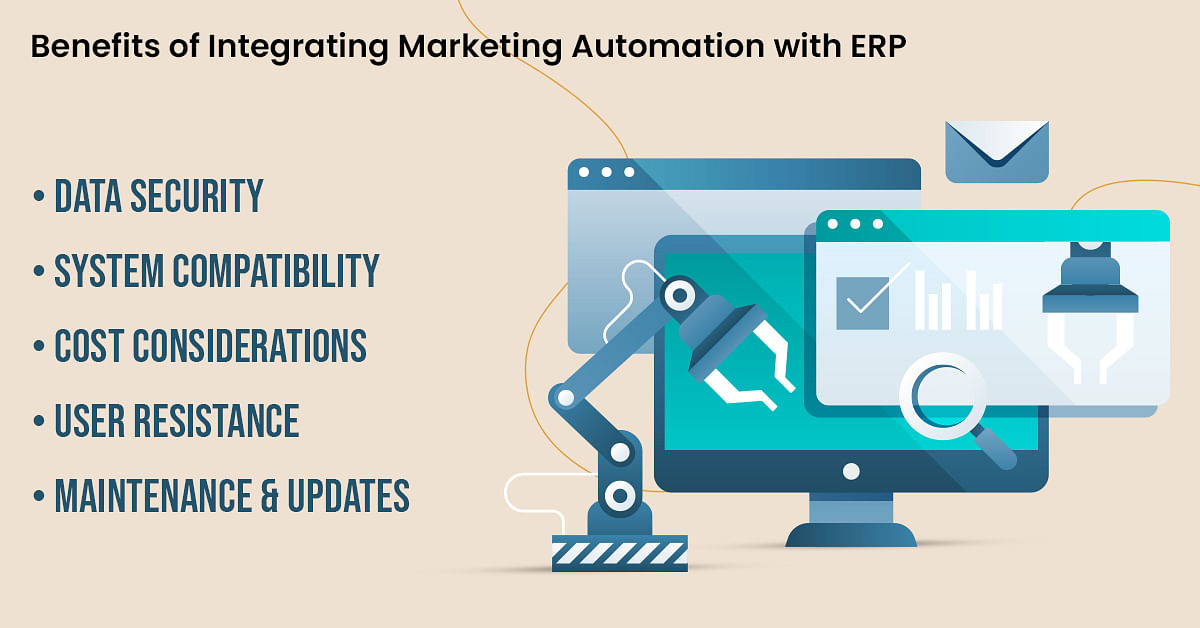In the world of business, efficiency is key, and the synergy between Marketing Automation and ERP (Enterprise Resource Planning) is proving to be a game-changer for companies looking to optimize their operations. Let's dive into the practical aspects of how these two powerful tools can work seamlessly together, enhancing overall productivity and driving better business outcomes.
Understanding Marketing Automation and ERP
Before delving into the integration details, let's grasp the fundamentals of Marketing Automation and ERP.
⇒ Marketing Automation Simplified
Marketing Automation involves using software to automate repetitive marketing tasks, streamlining workflows, and analyzing customer interactions. It encompasses email marketing, social media posting, lead nurturing, and other activities, allowing businesses to engage with their audience more effectively.
⇒ Decoding ERP
On the other hand, ERP is a comprehensive software solution that integrates and manages core business processes in real-time. It covers areas such as finance, human resources, supply chain, and more, providing a centralized platform for data management and decision-making.
⇒ The Need for Integration
While Marketing Automation and ERP serve different purposes, their integration can bring about significant advantages. Picture this: your marketing team generates leads through automated campaigns, and seamlessly, this data flows into your ERP system, aligning your sales and marketing efforts and providing a holistic view of customer interactions.

Benefits of Integrating Marketing Automation with ERP
✦ Streamlined Data Flow
Integration ensures a smooth flow of data between marketing and ERP systems. Customer data, sales leads, and other relevant information seamlessly transition from one system to another, eliminating manual data entry and reducing the chances of errors.
✦ Enhanced Customer Insights
By combining marketing and ERP data, businesses gain a 360-degree view of customer interactions. This comprehensive insight enables more personalized marketing strategies and better-informed decision-making across various departments.
✦ Improved Lead Management
Integration facilitates the alignment of marketing-generated leads with the sales process. As leads move through the sales funnel, the sales team can access real-time data from marketing efforts, ensuring timely and relevant follow-ups.
✦ Optimized Inventory Management
For businesses involved in product sales, integrating ERP with Marketing Automation helps optimize inventory management. The system can automatically adjust inventory levels based on sales generated through marketing campaigns, preventing overstock or stockouts.
✦ Efficient Order Processing
Seamless integration enables swift order processing. When a marketing campaign generates sales, the ERP system can immediately process orders, initiate invoicing, and update inventory levels, streamlining the entire order fulfillment process.
✦ Holistic Reporting & Analytics
With data from both Marketing Automation and ERP systems in one place, businesses can generate comprehensive reports and analytics. This holistic approach to data analysis empowers decision-makers with actionable insights for future marketing strategies and overall business planning.
Practical Steps for Integration
➔ Evaluate Compatibility
With data from both Marketing Automation and ERP systems in one place, businesses can generate comprehensive reports and analytics. This holistic approach to data analysis empowers decision-makers with actionable insights for future marketing strategies and overall business planning.
➔ Define Data Mapping
Clearly define how data will flow between systems. Identify key data points such as customer information, leads, and sales transactions. Establishing a robust data mapping strategy ensures that the right information reaches the right destination.
➔ Implement API Integration
Application Programming Interface (API) integration is a common method for connecting Marketing Automation and ERP systems. It allows seamless communication between the two platforms, ensuring data synchronization in real-time.
➔ User Training
Adequate training for users of both systems is crucial. Ensure that your team understands how the integrated systems work, emphasizing the benefits and best practices for efficient utilization.
➔ Regular Monitoring and Maintenance
Integration is an ongoing process. Regularly monitor data flows, conduct system checks, and promptly address any issues that may arise. This proactive approach ensures the continued smooth operation of the integrated systems.
Real-world Examples
Let's explore how businesses have successfully implemented Marketing Automation and ERP integration.
Improved Customer Experience
A retail business integrated its Marketing Automation and ERP systems to enhance the customer experience. By analyzing customer interactions from marketing campaigns and aligning them with ERP data, the business gained insights into customer preferences, enabling personalized marketing efforts.
Efficient Order Fulfilment
A manufacturing company streamlined its order fulfillment process by integrating ERP automation. When a marketing campaign led to increased sales, the integrated system automatically updated inventory levels, initiated order processing, and ensured timely delivery to customers.
Benefits of Integrating Marketing Automation with ERP
While the benefits of integration are evident, it's essential to acknowledge potential challenges:
✶ Data Security
Integrating systems requires careful consideration of data security. Ensure that sensitive information is protected during the integration process, and implement measures to prevent unauthorized access.
✶ System Compatibility
Not all Marketing Automation and ERP systems are compatible out-of-the-box. It's essential to assess compatibility and, if necessary, invest in third-party connectors or customization to bridge any gaps.
✶ Cost Considerations
Integration efforts may come with associated costs, including software, implementation, and training expenses. However, the long-term benefits often outweigh the initial investment.
✶ User Resistance
Employees may resist change, especially if they are accustomed to working with separate systems. Effective communication, training, and highlighting the benefits of integration can help mitigate resistance.
✶ Maintenance & Updates
As technology evolves, both Marketing Automation and ERP systems undergo updates. Regular maintenance and staying current with updates are crucial to ensuring continued compatibility and optimal performance.
Conclusion
ERP automation and integration is not just a technological trend but a strategic move toward enhancing business efficiency. By aligning marketing efforts with core business processes, businesses can achieve a unified approach to customer engagement, data management, and decision-making. As businesses navigate the ever-evolving landscape of technology, the integration of Marketing Automation and ERP emerges as a practical and impactful solution for those seeking to optimize their processes and stay ahead in today's competitive business environment.
Silent Infotech, your trusted partner in business solutions, specializes in ERP automation and seamless marketing integration. With a dedicated team of experts, we empower businesses to streamline operations, gain valuable customer insights, and achieve unparalleled efficiency. Elevate your business potential with Silent Infotech's tailored and human-centric approach to technology solutions.

Jignesh V
Jignesh Vaghasiya, COO of Silent Infotech, is a technology visionary with a passion for innovation. He has deep technical expertise and a commitment to client success to drive the company's growth. His relentless pursuit of new technologies, combined with his process-focused approach, has led to innovation and technology implementations that boost business outcomes. Jignesh's ability to connect with people makes him the ideal partner for onboarding new clients and fostering strong business relationships.
Schedule Consultation with Jignesh Schedule Now